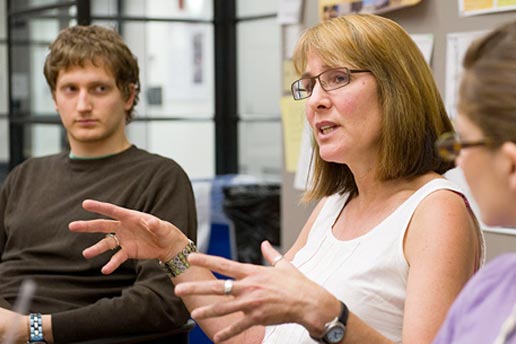
We deal more with the real world, where there are actual disagreements, and strong proponents on both sides.
Judith Layzer is Associate Professor of Environmental Policy and Head of Environmental Policy and Planning, Department of Urban Studies and Planning. She teaches 11.162, “Politics of Energy and the Environment,” one of the Energy Studies Minor electives. Her research and teaching focus on the roles of science, values, and storytelling in environmental politics, as well as on the effectiveness of different approaches to environmental planning and management.
Why should a student study energy at MIT?
First, what’s distinctive here is the breadth of perspective. Unlike many other schools, MIT is not a place where people say nuclear is bad, coal is bad, the future must be solar. At MIT, students have to deal with the real world, where there are actual disagreements and strong proponents on both sides of every issue. Studying energy at MIT, students are exposed to cutting-edge engineering ideas, but also to policy, politics, and economics. For example, consider two big, controversial technologies: nuclear power and carbon sequestration. Here, students will find engineers focusing on ways to make them happen, but they will also hear from those who don’t think those technologies are a good idea, or that the public won’t accept them. The real world is full of such disagreements, and students must confront them, or they will be ill-served by their education.
How would you describe your piece of the energy puzzle?
I provide the readings and lead discussions that reveal there are value-driven controversies around energy. Years ago, when I put together the first class on environmental politics at MIT, I looked for readings that weren’t simply about the technical aspects of policy. I couldn’t find any, so I starting writing case studies that tried to convey what people were fighting about. MIT students love these stories, which can provoke incredibly interesting discussions.
I tell students, “Engineers know how to build this. But the fact is, no one is going to let you.” The point is, many of the hardest questions are not technological. We’re pretty good at inventing technological solutions, but not always good at figuring out how to implement them. For instance, nuclear engineers at MIT are confident about nuclear power; they’ve invented new and interesting ways to put it in place. In my class, though, we read about Three Mile Island, and learn why no new plants have been built since the 1970s. That’s not to say they shouldn’t be built, but we have to understand why the public is nervous.
What is special about the contributions MIT students and graduates can make in addressing energy challenges?
MIT students are incredibly bright, but even more important, they have a tenacity and willingness to think about problems as though they can solve them. They are not cogs. If we give them a well-rounded enough education — with all the pieces, the way the Energy Studies Minor tries to do — it’s hard to imagine who in the world would be more effective at solving these incredibly hard problems.
Maybe part of it is what they get from the faculty. I’m relentless myself in the classroom, saying this stuff about the damage we’ve done to the environment is horrifying, overwhelming, and scary, but we have to deal with it. What choice do we have? Yes, it’s difficult, but you are the ones who have to fix it. At the same time, there is a mentality among the students at MIT, an attitude that things can be improved, and they bring that mentality to bear in whatever position they end up in. They don’t shrink under pressure, they just rise to the occasion.